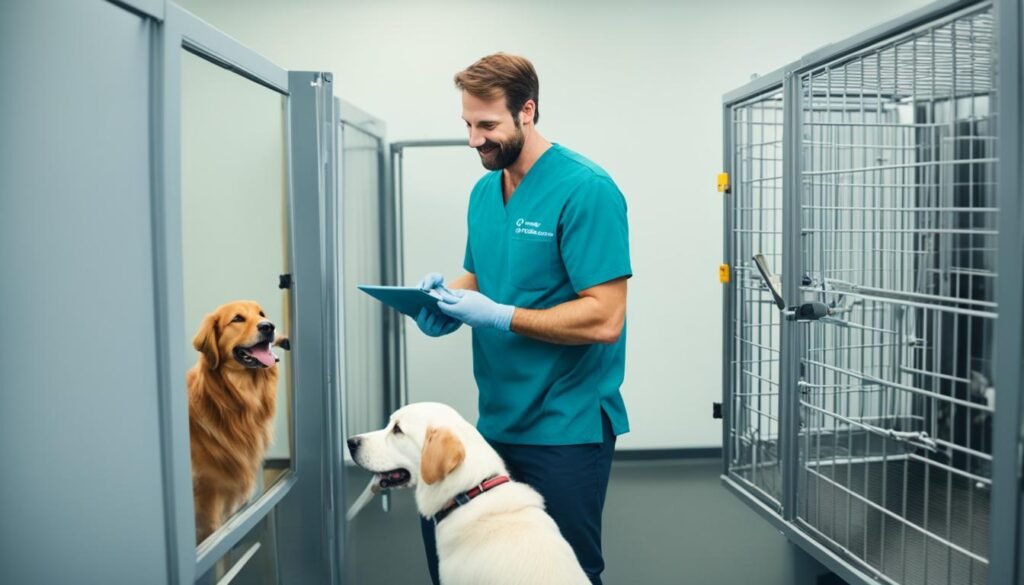Imagine this: you’re sitting in a cozy corner of your living room, cuddled up with your beloved dog, thinking about ways to earn some extra income. You’ve heard stories of people making big bucks by breeding their dogs and selling the puppies, and it sounds like a tempting side hustle. But should you really go down that path?
Meet Lisa, a dog lover with a golden retriever named Max. Like many dog owners, Lisa adores Max and often boasts about his good looks and friendly personality. One day, her friend mentioned how much money she made by breeding her own dog, and Lisa’s curiosity piqued.
Intrigued by the idea, Lisa started researching dog breeding for profit. She read success stories of breeders who made thousands of dollars selling cute, fluffy puppies. It seemed like easy money, and with her beautiful Max by her side, Lisa thought she had found the perfect opportunity to turn her love for dogs into a profitable venture.
But as Lisa delved deeper into the world of dog breeding, she soon came across a different side of the story. She discovered that responsible dog breeding is often not as lucrative as it seems. Breeding dogs requires a significant investment of time, money, and resources. Lisa realized that breeding dogs should not be solely motivated by financial gain, but rather a genuine passion for the breed and a commitment to their well-being.
Key Takeaways:
- Breeding dogs for profit is not as easy or profitable as it may seem.
- Responsible breeding requires a significant investment of time, money, and resources.
- Breeding dogs should be driven by a genuine passion for the breed and a commitment to their well-being.
- Consider the ethical implications and other alternatives, such as adoption, before deciding to breed.
- Starting a dog breeding business requires careful consideration and planning.
The Realities of Breeding Dogs for Profit
Breeding dogs for profit can be both challenging and risky. While the idea of making money through dog breeding may seem enticing, it’s important to understand the potential pitfalls and responsibilities involved. Responsible dog breeding requires careful planning, adherence to ethical practices, and a dedication to the health and well-being of the animals.
Irresponsible breeding practices can have serious consequences for the puppies and the breed as a whole. Breeding dogs too often or without proper health testing can result in puppies with genetic issues and health problems. Puppy mills, which prioritize profit above the welfare of the dogs, often produce sick animals with chronic medical conditions.
To make a profit as a dog breeder, one may be tempted to breed more frequently, breed more cheaply, or try to elevate the quality of the bloodline to charge higher prices. However, each of these approaches comes with its own risks and ethical concerns.
When breeding more frequently, there is a higher risk of physical and emotional strain on the female dog. Breeding too often can have detrimental effects on her health and well-being, leading to complications during pregnancy and delivery.
Attempting to breed more cheaply often means cutting corners when it comes to providing proper care, nutrition, and veterinary services for the dogs and puppies. This can have serious implications for the health and quality of the puppies, leading to unhappy customers and potential legal issues.
| Risks of Breeding Dogs for Money | Responsible Dog Breeding Tips | Making Money Breeding Dogs |
|---|---|---|
| Genetic issues | Thorough health testing | Breed more frequently |
| Health problems | Responsible breeding practices | Breed more cheaply |
| Complications during pregnancy and delivery | Proper care and nutrition for dogs and puppies | Elevate the quality of the bloodline |
| Sick animals from puppy mills | Commitment to the well-being of the animals |
When attempting to elevate the quality of the bloodline, breeders may invest in show and champion dogs, extensive genetic testing, and careful selection of mates. While these steps can potentially increase the value of the puppies, they also come with additional expenses and risks. The breeding of champion dogs can be costly, and there is no guarantee that every puppy will inherit the desired traits or qualities.
It is crucial to remember that breeding dogs should be driven by a genuine passion for the breed and a commitment to responsible practices, rather than solely focusing on financial gain.
By prioritizing responsible dog breeding practices, breeders can minimize the risks and contribute to the preservation and improvement of the breed. This includes thorough health testing, proper care for the dogs and puppies, and prioritizing the well-being of the animals over financial gain.
Section 3 will delve into the costs involved in responsible breeding and the financial considerations potential breeders should keep in mind.
The Costs of Responsible Breeding
Responsible breeding is a noble endeavor, but it comes with financial considerations that should not be overlooked. As a breeder focused on ethical dog breeding practices, I understand the importance of providing the best care for our beloved furry friends. However, it’s crucial to be aware of the expenses involved in maintaining a profitable dog breeding business.
One of the primary costs is acquiring a healthy purebred female dog. The price for a quality purebred female dog can range from $1,000 to $5,000, depending on the breed and lineage. It’s essential to invest in a healthy foundation for your breeding program to ensure the well-being and genetic soundness of future litters.
In addition to the initial cost of the breeding female, there are ongoing expenses to consider. Regular vaccinations, check-ups, and high-quality food are necessary for maintaining the health of your breeding dogs. Alongside these regular costs, each fertility cycle brings extraordinary expenses. During the female dog’s heat cycle, you need to provide extra care and guard her from random males to maintain the integrity of your breeding program.
To charge higher prices for your puppies and operate a successful and ethical dog breeding business, you may need to join breeding clubs and participate in dog shows. These activities often require membership fees, entry fees, and travel expenses. Additionally, investing in genetic testing helps ensure the health and soundness of your breeding dogs, but it can add to the overall costs of responsible breeding.
“The rewarding aspect of ethical dog breeding practices cannot be solely measured by financial gain. It’s the joy of knowing that you are contributing to the preservation and improvement of the breed.”
The Costs of Responsible Breeding – Breakdown
Here’s a breakdown of the costs involved in responsible dog breeding:
| Expense | Cost |
|---|---|
| Purchase of healthy purebred female dog | $1,000 to $5,000 |
| Regular vaccinations and check-ups | Varies depending on the vet |
| High-quality food | $50 to $100 per month |
| Extraordinary costs for each fertility cycle (guarding the female dog, additional care during the heat cycle) | Varies depending on the requirements |
| Breeding club membership fees | $100 to $500 per year |
| Entry fees and travel expenses for dog shows | Varies depending on the location and level of competition |
| Genetic testing | $100 to $500 per test |
These costs add up quickly, and it’s important to evaluate whether the financial investment aligns with your goals and expectations. While profitable dog breeding methods are possible, responsible breeding should always prioritize the health and well-being of the dogs above financial gain.
Time and Commitment Required
Breeding dogs is a labor-intensive endeavor that demands both time and commitment. It is crucial to allocate sufficient time and resources to ensure the well-being of your dogs and their puppies.
As a responsible breeder, I understand that female dogs should not be bred until they are fully mature, typically around 18 months to two years old. It is important to allow them to go through several fertility cycles to ensure their physical and mental readiness for reproduction.
During the breeding process, pregnancy, and whelping (the process of giving birth to puppies), breeders need to be readily available to provide constant care and attention. This includes monitoring the mother’s health, providing appropriate nutrition and exercise, and ensuring a safe and comfortable environment for the birthing process.
Furthermore, breeders must be prepared for the time commitment involved in socializing and caring for the puppies until they are ready to go to their new homes. This includes early socialization, proper training, and ensuring the puppies receive adequate veterinary care.
Commitment to Responsible Breeding
“Becoming a dog breeder requires a deep commitment to the well-being of the dogs and their progeny. It is a lifelong responsibility that extends beyond the breeding process itself.”
Successfully raising a healthy litter of puppies requires dedication, patience, and expertise in canine care. It is essential to establish a routine for feeding, cleaning, and nurturing the puppies, as this contributes to their development and future well-being.
As a breeder, I prioritize the socialization of the puppies, providing positive exposure to various environments, sounds, and stimuli. This helps them develop into well-adjusted dogs ready to join their new families.
By dedicating your time and energy to responsible breeding practices, you will not only contribute to the betterment of the breed but also establish a loyal and reputable customer base. Dog lovers appreciate breeders who invest their time and effort into producing healthy, well-socialized puppies.
Next, in section 5, we will discuss the process of finding the right mate and the associated expenses of stud fees.
Finding the Right Mate and Stud Fees
When it comes to breeding dogs for a side business, finding the right mate for your female dog is crucial. This involves considering various factors such as health, temperament, and compatibility with your breed’s standards. However, the process of finding the perfect mate involves additional expenses, including stud fees.
Stud fees can vary widely, ranging from a few hundred dollars to the price you paid for your own dog. It’s essential to carefully assess the pedigree, qualities, and reputation of the potential sire to ensure a healthy and successful breeding.
Furthermore, timing plays a vital role in dog breeding. The female dog has a limited window of fertility, and determining the peak fertile period can be challenging. Many breeders rely on veterinary assistance or use advanced methods, such as progesterone testing, to pinpoint the best time for breeding.
Given the complexities involved, breeders may need to invest in veterinary consultations and additional services to ensure a successful breeding.
“Finding the right mate for your female dog requires careful evaluation of their health, temperament, pedigree, and compatibility with breed standards.”
Arranging the breeding itself can also incur costs. Whether it’s traveling to the stud dog or bringing the stud dog to your location, transportation expenses, including fuel and accommodation, may need to be considered.
All these factors emphasize the importance of making a well-informed decision when choosing a mate for your dog. By investing time, effort, and resources, you increase the likelihood of producing healthy, high-quality puppies that potential buyers will be eager to bring into their homes.
Here’s an image that exemplifies the process of finding the right mate and the associated costs:
Marketing and Selling the Puppies
Once the puppies are born, breeders need to market and sell them to find loving homes. This step in the dog breeding side business can be challenging but crucial for making money breeding dogs. Let’s explore the various avenues breeders can take to ensure successful sales.
1. Online Advertising Platforms
One option is to utilize online advertising platforms to reach a wider audience. Websites like Craigslist and LetGo allow breeders to list their puppies for sale. However, it’s important to note that these platforms may attract bargain-hunters who are not willing to pay a premium price for purebred puppies.
2. Specialty Websites
Breeders can also consider using specialty websites that cater specifically to pet lovers and prospective dog owners. Platforms such as PuppySpot and PuppyFind provide a targeted audience but may have drawbacks like limited screening of buyers or the need to ship the puppies, which can be complicated and costly.
3. The American Kennel Club (AKC) Marketplace
The American Kennel Club (AKC) Marketplace is a reputable option for breeders looking to sell their puppies. While it comes with a listing fee, it provides breeders with access to a trustworthy community of potential buyers who are specifically interested in purebred dogs.
Ethical Considerations and Alternatives
Breeding dogs should not be solely motivated by financial gain. As a responsible breeder, I prioritize the health and well-being of the dogs and strive to improve the breed. Ethical dog breeding practices involve a genuine love and passion for the breed, not just a way to make money.
Instead of immediately pursuing breeding, it is crucial to consider adoption from local animal shelters as a compassionate alternative. There are many wonderful dogs waiting to be adopted, and breeding can contribute to the overpopulation of unwanted animals.
“Breeding dogs should be undertaken out of genuine love and passion for the breed, not just as a way to make money.”
By adopting a dog, you provide a loving home for a deserving animal and help alleviate the strain on animal shelters. This option offers a fulfilling experience and allows you to make a positive impact on a dog’s life.
When considering breeding, it is important to engage in responsible dog breeding practices, focusing on the well-being of the dogs and the betterment of the breed.

| Considerations | Benefits |
|---|---|
| Adopting from local animal shelters |
|
| Prioritizing responsible breeding practices |
|
Another alternative is considering fostering dogs. Fostering allows you to provide temporary care and love to dogs while they wait for their forever homes. This option provides fulfillment and helps prepare dogs for adoption.
In conclusion, responsible dog breeding involves prioritizing the health and well-being of the dogs, along with a genuine passion for the breed. Breeding should not be pursued solely for financial gain. Considering adoption or fostering from local animal shelters offers a compassionate alternative and can be immensely rewarding.
Starting a Dog Breeding Business as a Side Hustle
While considering dog breeding as a side hustle, it’s crucial to evaluate the risks, responsibilities, and financial aspects involved. Breeding dogs is a serious endeavor that requires time, resources, and expertise. It should not be driven solely by the desire for financial gain. Genuine commitment to the breed, the willingness to invest in proper care and testing, and prioritizing the well-being of the dogs are essential factors to consider.
My dog breeding journey:
- Commitment to the Breed: To embark on a dog breeding side business, I focused on a specific breed I am passionate about. I immersed myself in learning about the breed’s characteristics, health issues, and standards set by kennel clubs.
- Responsible Breeding: Ethical breeding practices and responsible care for the dogs became my top priorities. I learned about proper health testing protocols and invested in pedigree, registered foundation dogs to ensure the quality and lineage of the puppies.
- Time and Resources: Breeding dogs requires a significant investment of time and resources. I dedicated time to the care of the breeding pair, the pregnancy, and the whelping process. Additionally, I ensured proper housing, veterinary care, and supplies for the dogs.
- Legal Requirements: I familiarized myself with the legal requirements and regulations for dog breeding in my area. I obtained the necessary licenses and permits to operate my breeding business within the legal framework.
- Marketing and Networking: To find suitable homes for the puppies, I invested in marketing efforts and built a reputable reputation as an ethical breeder. I connected with other breeders, attended dog shows, and joined online communities to expand my network and reach potential buyers.
Starting a dog breeding business as a side hustle can be a rewarding endeavor, but it requires careful planning, dedication, and an unwavering commitment to the well-being of the dogs. The financial aspect should not overshadow the love and passion for the breed. Breeding dogs responsibly and ethically ensures the preservation and improvement of the breed, creating a positive impact on the dog community as a whole.
Steps to Starting a Dog Breeding Business
If after careful consideration, you have decided to start a dog breeding business, there are several steps you should follow:
- Immerse yourself in canine education and seek guidance from experienced breeders.Learning about dog breeding, genetics, and responsible breeding practices is crucial. Connect with experienced breeders who can provide valuable insights and mentorship.
- Choose the breed(s) you are passionate about and specialize in them.Focus on breeds that you genuinely care about and have a deep understanding of. Specializing in specific breeds will help you develop expertise and establish a niche within the market.
- Design a rigorous health testing protocol and prioritize the well-being of the dogs.Ensuring the health and genetic soundness of your breeding dogs is essential. Implement a comprehensive health testing program to screen for inherited conditions and promote the well-being of the dogs.
- Invest in pedigreed, registered foundations for your breeding program.Acquire high-quality, pedigreed dogs that are registered with reputable kennel clubs. This will give your breeding program credibility and maintain breed standards.
- Ensure you have proper housing and supplies for your dogs.Create a safe and comfortable environment for your dogs with adequate housing, exercise areas, and appropriate supplies. Their well-being should always be a top priority.
- Learn and comply with the legal requirements for dog breeding in your area.Familiarize yourself with the laws and regulations governing dog breeding in your region. Ensure that your breeding business operates in full compliance with these standards.
- Build a reputable and transparent reputation as an ethical breeder.Establish a reputation as a responsible and ethical breeder by providing transparency, honesty, and excellent customer service. This will attract potential buyers and help you build long-term relationships within the dog breeding community.
- Establish a relationship with a trusted reproductive vet.Work with a veterinarian experienced in canine reproduction to ensure the well-being of your breeding dogs and assist in managing the breeding process.
- Meticulously interview potential owners to ensure the well-being of the puppies.Screen potential puppy buyers through thorough interviews to ensure they are committed to providing a loving and responsible home for the puppies.
- Offer lifelong support and guidance to puppy owners.Provide ongoing support to puppy owners, offering guidance and assistance throughout the life of the dog. This helps establish trust and reinforces your commitment to producing healthy and happy puppies.
Conclusion
Breeding dogs for profit is a decision that should not be taken lightly. It requires a significant investment of time, money, and expertise to ensure the well-being of the dogs involved. While it is possible to make some profit from breeding dogs, the focus should always be on responsible and ethical practices.
Responsible breeders prioritize the health and well-being of the dogs above financial gain. They invest in proper health testing, provide quality care for the dam and puppies, and strive to find loving homes for their puppies. Breeding dogs should be driven by a genuine passion for the breed and a commitment to its preservation and improvement.
Before embarking on a dog breeding venture, it is important to understand the costs, responsibilities, and potential risks involved. Breeding dogs should be viewed as a labor of love rather than a purely profit-driven endeavor. By prioritizing ethical dog breeding practices, we can contribute to the betterment of our beloved canine companions.
FAQ
Should I breed my dog for a side hustle?
Breeding dogs for profit may seem tempting, but it’s important to consider the responsibilities and realities that come with it. Responsible dog breeding is often not a profitable venture, as it involves high expenses for health testing, veterinary care, and proper care for the dam and puppies. It should be driven by a genuine passion for the breed and a commitment to their well-being, rather than financial gain.
What are the risks of breeding dogs for money?
Breeding dogs for profit can be challenging and risky. Irresponsible breeding practices can lead to puppies with genetic issues and health problems. Puppy mills, which prioritize profit over welfare, often produce sick animals. To make a profit, breeders may need to breed more frequently, breed more cheaply, or invest in elevating the quality of the bloodline, all of which come with their own risks and ethical concerns.
What are the costs of responsible breeding?
Responsible breeding requires a significant financial investment. The costs include acquiring a healthy purebred female dog, vaccinations, check-ups, food, and extraordinary costs associated with each fertility cycle. Breeders also need to join breeding clubs, show their dogs, and invest in genetic testing to charge higher prices for their puppies. All these expenses can make it difficult to turn a profit.
How much time and commitment is required for breeding dogs?
Breeding dogs requires a significant amount of time, training, and commitment. Female dogs should not be bred until they are at least 18 months to two years old. Breeders need to be available to provide constant care and attention during the breeding process, pregnancy, and whelping. Additionally, breeders must be prepared for the time commitment involved in socializing and caring for the puppies until they are ready for their new homes.
What are the considerations for finding the right mate and stud fees?
Finding the right mate for your female dog involves additional expenses such as stud fees, which can range from a few hundred dollars to the price you paid for your own dog. It is crucial to carefully select the mate and consider any potential health and temperament issues before proceeding with the breeding. Timing the breeding is crucial, and breeders may need veterinary assistance to determine the peak fertile period of the female dog. Stud fees and the logistics of arranging the breeding can also incur costs.
How can I market and sell the puppies?
Breeders need to market and sell their puppies. Online platforms like Craigslist and LetGo may attract bargain-hunters, while platforms like PuppySpot and PuppyFind may have drawbacks such as limited screening of buyers or the need to ship the puppies. The American Kennel Club (AKC) Marketplace can be a reputable option but comes with a listing fee. Proper marketing and finding reliable buyers is essential to ensure the well-being of the puppies.
What are the ethical considerations and alternatives to breeding dogs for profit?
Breeding dogs should not be solely motivated by financial gain. Responsible breeders prioritize the health and well-being of the dogs and work towards improving the breed. Before deciding to breed, it is crucial to consider adoption from local animal shelters as an alternative. Breeding can contribute to the overpopulation of unwanted animals. Breeding should be undertaken out of genuine love and passion for the breed, not just as a way to make money.
How can I start a dog breeding business as a side hustle?
Starting a dog breeding business as a side hustle requires careful consideration of the risks, responsibilities, and financial aspects involved. It requires time, resources, and expertise to breed dogs responsibly and ethically. Potential breeders should consider their commitment to the breed, their ability to invest in necessary care and testing, and their willingness to prioritize the well-being of the dogs above financial gain.
What are the steps to starting a dog breeding business?
If after careful consideration, someone decides to start a dog breeding business, they should:
– Immerse themselves in canine education and seek guidance from experienced breeders.
– Choose the breed(s) they are passionate about and specialize in them.
– Design a rigorous health testing protocol and prioritize the well-being of the dogs.
– Invest in pedigreed, registered foundations for their breeding program.
– Ensure they have proper housing and supplies for their dogs.
– Learn and comply with the legal requirements for dog breeding in their area.
– Build a reputable and transparent reputation as an ethical breeder.
– Establish a relationship with a trusted reproductive vet.
– Meticulously interview potential owners to ensure the well-being of the puppies.
– Offer lifelong support and guidance to puppy owners.
Should breeding dogs for profit be taken lightly?
Breeding dogs for profit should not be taken lightly. Responsible breeding requires a significant amount of time, resources, and expertise. While it is possible to make some profit from breeding dogs, the primary focus should always be on the health and well-being of the dogs. Breeders should prioritize ethical practices, proper health testing, and finding loving homes for their puppies. Breeding dogs should be a labor of love, driven by a genuine passion for the breed and a commitment to its preservation and improvement.







No Comment! Be the first one.